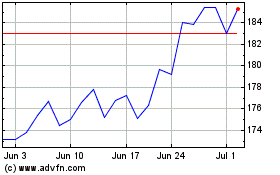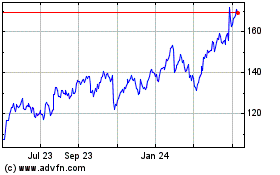By Newley Purnell
NEW DELHI -- After Walmart Inc. sealed a $16 billion deal last
year to buy India's biggest domestic e-commerce startup, it got
some bad news. India was changing its e-commerce regulations.
Foreign-owned online retailers would need to modify their supply
chains and stop deep discounting. Those rules didn't apply to
Indian companies.
India, the world's biggest untapped digital market, has suddenly
become a much tougher slog for American and other international
players.
Over the past year, Indian policy makers have begun erecting
roadblocks through special requirements for how U.S. tech companies
structure their operations and handle data collected from Indian
customers, according to industry executives and experts following
the market.
Seeking to match China's success at protecting and promoting
homegrown tech giants, such as Alibaba Group Holding Ltd., Tencent
Holdings Ltd. and TikTok parent Bytedance Inc., India is
increasingly trying to shelter domestic companies. In the
crosshairs, beyond Walmart, are firms including Amazon.com Inc.,
Alphabet Inc.'s Google and Facebook Inc. and its WhatsApp messaging
service.
Indian officials say they have an array of aims: protect small
bricks-and-mortar businesses, secure user data and allow room for
India's own tech firms to grow. That smacks of protectionism to
Western tech executives, who say India's goals make it difficult to
predict business conditions.
India's moves come as populist sentiment rises globally and U.S.
technology titans come under scrutiny around the world for their
use of personal data and potentially anticompetitive tactics.
Europe, too, has been cracking down on U.S. tech firms, although
European Union officials say their efforts are driven more by
regulatory goals than by any desire to protect local companies.
Europe has few domestic tech titans.
India's new rules apply to Flipkart Group, the Bangalore-based
Amazon competitor that Walmart acquired to gain a foothold in
India's fast-growing e-commerce sector. They also affect Amazon,
which is plowing $5 billion into India to expand its own
operations.
In each sector where Indian bureaucrats are throwing up
challenges, Indian companies stand to benefit.
"I know there are some who look to the Chinese model with
admiration," said Nick Clegg, a former deputy prime minister of
Britain now serving as Facebook's vice president for global
affairs, in a talk at a New Delhi think tank in September. "They
see the success of Chinese internet companies like Alibaba and
TikTok and wonder if the same protectionist approach could reap
rewards for India, too." He called on India to reject that
model.
The Indian government's primary goal is to encourage economic
growth, said Gunjan Bagla, managing director of Malibu,
Calif.-based consulting firm Amritt Inc., which helps American
firms do business in India. Policy makers there are struggling to
get a handle on the rapid rate of "disruptive innovation by the
likes of WhatsApp and Uber," he said.
An Amazon spokeswoman said the company is working with Indian
policy makers and will "watch closely as the country's leadership
sets its course for the future." A Google spokesman said the
company thinks "governments across the world need to look at
striking the right balance to protect the interests of citizens and
promote innovation." Walmart declined to comment.
Indian policy makers have disputed that their actions aim to
hobble foreign companies. They say they want to nurture domestic
players and to protect data gathered in the country, which is why
they are pushing for servers to be located on Indian soil.
"I have been very clear: We will never compromise our data
sovereignty," said Ravi Shankar Prasad, India's communications,
electronics and information technology minister, at a government
conference in October.
A spokesman for Prime Minister Narendra Modi's Bharatiya Janata
Party denied the government was pursuing protectionist policies or
making it hard for U.S. tech companies to operate. He said the
government welcomes U.S. firms, but that they "cannot be allowed to
indulge in anticompetitive practices," referring to Amazon and
Walmart competing with India's mom-and-pop shops.
"Every country has data protection laws and regulatory
mechanisms," said the spokesman.
India represents the world's biggest market for what executives
refer to as the next billion users -- consumers who have never
searched or shopped online or made a digital payment.
There are 665 million internet users in India, according to the
Telecom Regulatory Authority of India, meaning 685 million have yet
to get online. Forrester Research Inc. projects Indian e-commerce
sales to more than double to $68.4 billion by 2022, from $26.9
billion last year.
India has produced few startup unicorns -- firms valued at $1
billion or more -- that don't face competition from American
companies.
"One of the lessons they draw from China is that protectionism
can work, " said Julian Gewirtz, a Harvard University researcher
who studies China and has followed developments in India. "They see
these huge companies that go public and are built on protectionism
and state support. That is the most difficult argument to push back
against."
Indian tech entrepreneurs have a history of cloning American
companies and giving them a local twist. In 2007, two former Amazon
employees launched Flipkart, which quickly outpaced other Indian
e-commerce sites. Digital-payments company Paytm, launched in 2010,
allows consumers to use its app to pay for school fees and utility
bills, much like PayPal Holdings Inc. does. India's homegrown
version of Uber Technologies Inc., ride-hailing startup ANI
Technologies Pvt.'s Ola, launched in 2011.
Then the American titans began showing up. Amazon launched its
India website in 2013. Walmart's purchase of Flipkart came last
year. Now Amazon and Flipkart command more than 80% of all online
shopping sales, according to Morgan Stanley, leaving domestic
players as also-rans.
Uber launched in India in 2013 and has captured significant
market share from Ola. Ola co-founder Bhavish Aggarwal has accused
Uber of "capital dumping," or unfairly using its financial might to
underprice rides to gain market share. An Uber spokesman declined
to comment.
Google and Facebook, which have no sizable Indian rivals,
dominate digital advertising. Facebook's WhatsApp messaging service
has become India's default digital town square, used by family and
friends to chat and by businesses to keep in touch with customers.
It also has been used to spread rumors that have led to mob
violence, leading to condemnation by government officials.
When Prime Minister Modi was elected in 2014, he pledged to
improve India's image as a place to do business. He eased
foreign-direct-investment laws and replaced complicated taxes with
a nationwide levy on goods and services.
During his re-election campaign last year, government officials
began privately circulating draft policies on issues such as
e-commerce and rules requiring data to be stored within the
country.
Requiring local storage of data when computing is often done in
the cloud could force U.S. companies to use Indian data centers.
That might increase costs and raise the possibility that the Indian
government would seek access.
India's telecommunications regulator has been considering new
rules that could force WhatsApp to allow the government access to
messages on national-security grounds, or to trace messages that
spur violence. WhatsApp has a policy of protecting user privacy
with end-to-end encryption.
In February 2018, WhatsApp launched, for a limited number of
users, a digital-payment service that runs on an Indian government
platform that allows real-time money transfers. WhatsApp said at
the time it hoped to expand it to all users in India soon.
Nearly two years later, WhatsApp has yet to receive government
permission to do so -- a blow to Facebook's effort to wring revenue
from WhatsApp in India, its biggest market. New Delhi says that is
because WhatsApp's plan wouldn't comply with rules requiring all
payments data to be kept inside the country.
A WhatsApp spokesman said the company already has "localized the
required payments data and are awaiting government approval."
One beneficiary of the stalled rollout is Paytm, the Indian
digital-payments company.
Walmart had no warning that e-commerce regulations would change
after its acquisition of Bangalore-based Flipkart Group. It and
other U.S. e-commerce players sought clarifications after the Dec.
26 government announcement, according to people familiar with the
issue.
In January, an influential Hindu nationalist economic group
linked to Prime Minister Modi's party asked him in a letter to
resist any efforts by the American companies to push back against
or evade the law. In a separate letter, a group representing Indian
merchants threatened to initiate a nationwide boycott of Flipkart
and Amazon if the new regulations weren't enforced.
When Prime Minister Modi traveled to New York in September to
attend the United Nations General Assembly, he met with U.S. chief
executives and other business leaders and encouraged them to
continue to invest in India. When it came time for executives to
provide feedback, the first issue executives raised was data
localization rules, according to people familiar with the matter.
Prime Minister Modi's office didn't respond to requests for comment
about the meeting.
E-commerce executives met with Piyush Goyal, India's minister of
commerce and industry, in New Delhi in June. Amit Agarwal, who
heads Amazon's India operations, and Kalyan Krishnamurthy,
Flipkart's chief executive, told Mr. Goyal they were dissatisfied
with the tightening of e-commerce rules, according to people
familiar with the matter. Spokespeople for Amazon and Flipkart
declined to comment.
They told him they had invested heavily in India, educating
consumers about the benefits of online shopping and boosting the
sector for all firms. In effect, they said, they have created a
huge online-shopping market from scratch.
Mr. Goyal responded that India needs marketplaces -- open
platforms for buying and selling that can be used by India's
mom-and-pop shops -- not monolithic websites that act as single
markets, people familiar with the meeting said.
Mr. Goyal told reporters in October that Prime Minister Modi's
government "is clear about standing together with the country's
small retailers. We worry for them, and we won't let any harm to
come to them."
--Rajesh Roy contributed to this article.
Write to Newley Purnell at newley.purnell@wsj.com
(END) Dow Jones Newswires
December 03, 2019 10:39 ET (15:39 GMT)
Copyright (c) 2019 Dow Jones & Company, Inc.
Alphabet (NASDAQ:GOOGL)
Historical Stock Chart
From Mar 2024 to Apr 2024

Alphabet (NASDAQ:GOOGL)
Historical Stock Chart
From Apr 2023 to Apr 2024
